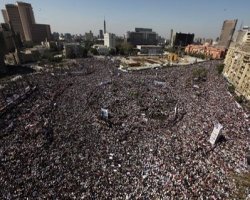Thousands of Egyptians have gathered for prayers for what has been billed as a "victory march" through Cairo's Tahrir Square to mark the overthrow of longtime leader Hosni Mubarak a week ago.
The groups that sparked the 18-day revolt that led to Mubarak's downfall are calling the day the "Friday of Victory and Continuation,'' a name that reflects both their pride in forcing a change in national leadership and their worries about the future.
The aim of the pro-democracy march was to keep the upbeat spirit of the earlier protests alive.
For the first time since he was banned from leading weekly Friday prayers in Egypt 30 years ago, prominent Muslim scholar Yusuf al-Qaradawi lead millions in the Friday prayers from Tahrir Square on Friday.
The Coalition of the Revolution Youth, which groups pro-democracy movements that helped launch the revolt, called for the gathering to "remember the martyrs of freedom and dignity and justice". At least 365 people were killed and 5,500 more injured in the protests, according to Egypt's health ministry.
Pro-Mubarak mobs attacked pro-democracy protesters and targeted journalists from numerous international news outlets throughout the uprising.
Pro-democracy activists are also seeking an investigation into the deaths during the uprising, a lifting of the decades-old emergency law, and support for the pay strikes that have surged around the country.
"We are going today to commemorate the martyrs and in doing so we are awaiting justice," Mohammed Waked, a protest organizer, said.
"If those detained during the protests are not released, let alone the older political prisoners, it would be a bad sign," he said. "It would show the army is not sincere about political reforms."
Pressure mounts
The coalition has vowed to keep up the pressure to ensure the rest of its political demands are met, including the "immediate release of all detainees," it said in statement posted on Facebook.
The situation in Egypt remains unsettled amid labor unrest and worries the military council running the country will not implement promised reforms.
Pressure remains on the interim military government, however, from the leaders of the protests who want political prisoners freed, emergency rule lifted, and fair elections soon.
Hundreds of people went missing during the protests, rights groups said, blaming the army which they also accused of torture.
Gamal Eid, a lawyer who heads the Arabic Network for Human Rights Information, said: "There are hundreds of detained, but information on their numbers is still not complete ... The army was holding detainees."
Amnesty International (AI), the UK-based human-rights watchdog, called on the Egyptian military to halt the use of torture against detainees, saying it had fresh evidence of abuse.
Both AI and the New York-based Human Rights Watch said they interviewed former detainees who described being tortured by the military.
Since Mubarak's fall, Egyptian workers have tested the limits of their new-found freedom, staging pay strikes despite calls from the governing military council for them to return to work and warning of "disastrous" consequences should strikes continue.
Workers are calling for the resignation of the leaders of state-controlled trade unions and company board members, who they accuse of corruption, as well as for higher wages and better working conditions.
PHOTO CAPTION
Millions gather in Tahrir square for Friday prayers and a demonstration in Cairo, Egypt, Friday Feb. 18, 2011.
Al-Jazeera


 Home
Home Discover Islam
Discover Islam Quran Recitations
Quran Recitations Lectures
Lectures
 Fatwa
Fatwa Articles
Articles Fiqh
Fiqh E-Books
E-Books Boys & Girls
Boys & Girls  Ramadan
Ramadan Fatwa Audios
Fatwa Audios Month of Mercy
Month of Mercy Women
Women Eed Al- Fitr
Eed Al- Fitr Food Recipes
Food Recipes Videos
Videos

 Prayer Times
Prayer Times












